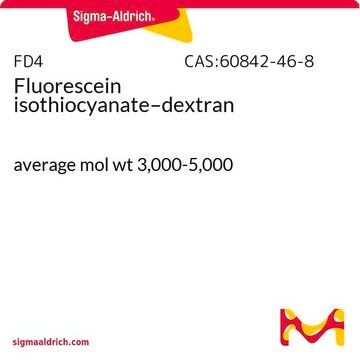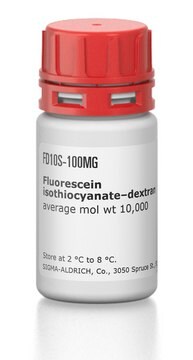A9771
Albumin–fluorescein isothiocyanate conjugate
protein bovine
Synonym(s):
FITC-albumin
Sign Into View Organizational & Contract Pricing
All Photos(5)
About This Item
Recommended Products
biological source
protein from bovine
Quality Level
form
powder
extent of labeling
≥7 mol FITCmol albumin
technique(s)
ELISA: suitable
solubility
10 mM Tris pH 7.0: 10 mg/mL
application(s)
detection
storage temp.
2-8°C
Looking for similar products? Visit Product Comparison Guide
General description
Albumin makes up 60% of the plasma protein, which is produced by the liver. It regulates colloid osmotic pressure. Albumin is implicated in the transportation, distribution and metabolism of fatty acids, thyroid hormones and drugs. It reduces weight gain, blocks pulmonary edema, decreases ascites and lowers tissue edema.
Application
Albumin−fluorescein isothiocyanate conjugate has been used:
- as a control to compare the intracellular delivery efficiency of proteins with or without carrier
- for the fluorescent visualization of proteins and cells
- as a blocking agent in ELISA
- as a chemical for brain perfusion and fixation
- for in vivo capillary–epithelial permeability experiment
- for confocal microscopy of right ventricular (RV) vasculature in rats
Preparation Note
Prepared from crystallized and lyophilized albumin (A 4378).
Signal Word
Danger
Hazard Statements
Precautionary Statements
Hazard Classifications
Resp. Sens. 1 - Skin Sens. 1
Storage Class Code
11 - Combustible Solids
WGK
WGK 3
Flash Point(F)
Not applicable
Flash Point(C)
Not applicable
Choose from one of the most recent versions:
Certificates of Analysis (COA)
Lot/Batch Number
Don't see the Right Version?
If you require a particular version, you can look up a specific certificate by the Lot or Batch number.
Already Own This Product?
Find documentation for the products that you have recently purchased in the Document Library.
Antonio Brante et al.
The Journal of experimental biology, 212(Pt 14), 2287-2295 (2009-06-30)
Encapsulation is a common strategy among marine invertebrate species. It has been shown that oxygen and food availability independently constrain embryo development during intracapsular development. However, it is unclear how embryos of species with different feeding strategies perceive these two
Ischemia-induced Drp1 and Fis1-mediated mitochondrial fission and right ventricular dysfunction in pulmonary hypertension
Tian L, et al
Journal of Molecular Medicine, 95(4), 381-393 (2017)
Molecular mechanisms of proteinuria
Molecular and Genetic Basis of Renal Disease (2008)
George A Tanner et al.
American journal of physiology. Renal physiology, 296(6), F1269-F1278 (2009-04-03)
Many aspects of the glomerular filtration of macromolecules remain controversial, including the location of the major filtration barrier, the effects of electrical charge, and the reason the filtration barrier does not clog. We examined these issues in anesthetized Necturus maculosus
Philbert S Tsai et al.
The Journal of neuroscience : the official journal of the Society for Neuroscience, 29(46), 14553-14570 (2009-11-20)
It is well known that the density of neurons varies within the adult brain. In neocortex, this includes variations in neuronal density between different lamina as well as between different regions. Yet the concomitant variation of the microvessels is largely
Our team of scientists has experience in all areas of research including Life Science, Material Science, Chemical Synthesis, Chromatography, Analytical and many others.
Contact Technical Service







